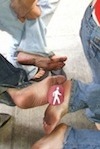History is watching. The story of how we are reacting to disease and extreme poverty and hunger is being written. How are you using your imaginative and creative abilities to tell a good story? Art is about making, but it is never better than when it accompanies a life well made. Set your compass toward living a seamless creative life where the full weight of your gifts are offered to the great needs of the world, from the need for beauty to the need for vaccines for the poorest children. This is the just and artful life.
 When we moved away from Franklin, I said we’d never be able to return to such a small town with its small thoughts, but that was before I was so tired. I still wrestle with feeling like I sold out. I still don't know exactly how to live out the Isaiah 55 call in a small-town context. It's not as clear. The real dramatic, tension-filled moments of triumph or defeat are not as visible. Here, the beauty and affluence shadow the brokenness.
When we moved away from Franklin, I said we’d never be able to return to such a small town with its small thoughts, but that was before I was so tired. I still wrestle with feeling like I sold out. I still don't know exactly how to live out the Isaiah 55 call in a small-town context. It's not as clear. The real dramatic, tension-filled moments of triumph or defeat are not as visible. Here, the beauty and affluence shadow the brokenness. When we moved away from Franklin, I said we’d never be able to return to such a small town with its small thoughts, but that was before I was so tired. I still wrestle with feeling like I sold out. I still don't know exactly how to live out the Isaiah 55 call in a small-town context. It's not as clear. The real dramatic, tension-filled moments of triumph or defeat are not as visible. Here, the beauty and affluence shadow the brokenness.
When we moved away from Franklin, I said we’d never be able to return to such a small town with its small thoughts, but that was before I was so tired. I still wrestle with feeling like I sold out. I still don't know exactly how to live out the Isaiah 55 call in a small-town context. It's not as clear. The real dramatic, tension-filled moments of triumph or defeat are not as visible. Here, the beauty and affluence shadow the brokenness.



















